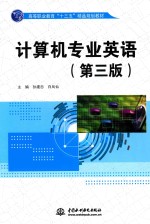图书介绍
高等职业教育“十三五”精品规划教材 计算机专业英语 第3版2025|PDF|Epub|mobi|kindle电子书版本百度云盘下载

- 孙建忠,白凤仙主编 著
- 出版社: 北京:中国水利水电出版社
- ISBN:7517046608
- 出版时间:2016
- 标注页数:226页
- 文件大小:49MB
- 文件页数:234页
- 主题词:电子计算机-英语-高等职业教育-教材
PDF下载
下载说明
高等职业教育“十三五”精品规划教材 计算机专业英语 第3版PDF格式电子书版下载
下载的文件为RAR压缩包。需要使用解压软件进行解压得到PDF格式图书。建议使用BT下载工具Free Download Manager进行下载,简称FDM(免费,没有广告,支持多平台)。本站资源全部打包为BT种子。所以需要使用专业的BT下载软件进行下载。如BitComet qBittorrent uTorrent等BT下载工具。迅雷目前由于本站不是热门资源。不推荐使用!后期资源热门了。安装了迅雷也可以迅雷进行下载!
(文件页数 要大于 标注页数,上中下等多册电子书除外)
注意:本站所有压缩包均有解压码: 点击下载压缩包解压工具
图书目录
Chapter 1 The History and Future of Computers1
学习指导1
1.1 The Invention of the Computer1
1.1.1 The ENIAC1
1.1.2 The UNIVAC I2
1.2 Computer Generations2
1.2.1 First-Generation Computers:1951~19583
1.2.2 Second-Generation Computers:1959~19633
1.2.3 Third-Generation Computers:1964~19704
1.2.4 Fourth-Generation Computers:1971~?4
1.2.5 Generationless Computers5
Reading Material: Classes of Computing Applications and Their Characteristics6
科技英语的特点7
Exercises10
Chapter 2 Basic Organization of Computers11
学习指导11
2.1 Introduction11
2.2 System Buses12
2.3 Instruction Cycle13
2.4 CPU ORGANIZATION15
Reading Material: Eight Great Ideas in Computer Architecture17
计算机英语专业词汇的构成19
Exercises23
Chapter 3 Binary System and Boolean Algebra24
学习指导24
3.1 The Decimal System24
3.2 The Binary System26
3.3 Boolean Algebra26
数学公式的读法(Pronunciation of mathematical expressions)28
Exercises31
Chapter 4 Elementary Data Structures32
学习指导32
4.1 Stacks and queues32
4.1.1 Stacks32
4.1.2 Queues33
4.2 Linked lists35
4.2.1 Searching a linked list36
4.2.2 Inserting into a linked list36
4.2.3 Deleting from a linked list36
4.2.4 Sentinels37
Reading Material: Related Concepts38
常用英汉互译技巧40
Exercises45
Chapter 5 Operating System46
学习指导46
5.1 OS Functions46
5.1.1 Resource allocation and related functions46
5.1.2 User interface related functions48
5.2 FreeBSD vs.Linux vs.Windows 200049
Reading Material: RATs52
被动语态的译法54
Exercises57
Chapter 6 Software Engineering58
学习指导58
6.1 Basic Software Concepts58
6.1.1 Application Software59
6.1.2 System Software59
6.2 The Software Life Cycle60
6.2.1 System engineering and analysis61
6.2.2 Software requirements analysis61
6.2.3 Design61
6.2.4 Coding61
6.2.5 Testing61
6.2.6 Maintenance62
6.3 Prototyping63
Reading Material: Software Engineering Methodologies64
长定语(从句)的翻译技巧之一66
Exercises69
Chapter 7 Programming Language70
本章学习指导70
7.1 Introduction to Programming Language70
7.2 Object-oriented Programming72
7.3 OMG's Unified Modeling Language(UML)73
Reading Material: Programming Paradigms75
长定语(从句)的翻译技巧之二78
Exercises81
Chapter 8The Internet82
学习指导82
8.1 The Internet: Key Technology Concepts82
8.2 Other Internet Protocols and Utili Programs88
8.3 Internet Service Providers89
Reading Material: Transition from IPv4 to IPv691
英语长句的翻译92
Exercises96
Chapter 9 The World Wide Web97
学习指导97
9.1 Hypertext97
9.2 Markup Languages98
9.3 Web Servers and Clients100
9.4 Web Browsers101
Reading Material: Features of The Internet and The Web102
学术论文的英文写作简介107
Exercises109
Chapter 10 Network Security110
学习指导110
10.1 Secure Networks and Policies110
10.2 Aspects of Security111
10.3 Responsibiliry and Control111
10.4 Integrity Mechanism111
10.5 Access Control and Passwords112
10.6 Encryption and Privacy112
10.7 Public Encryption113
10.8 Authentication with Digital Signatures114
10.9 Packet Filtering115
10.10 Internet Firewall Concept116
Reading Material: KINDS OF SECURITY BREACHES117
科技论文标题的写法118
Exercises120
Chapter 11 Database System121
学习指导121
11.1 Overview121
11.2 Database Models123
11.2.1 Flat File123
11.2.2 Relational123
11.2.3 Hierarchical124
11.2.4 Other Database Models125
11.3 Data Mining126
英文论文引言的写作技巧127
Exercises134
Chapter 12 Multimedia and Compuer Animations135
学习指导135
12.1 Multimedia135
12.1.1 Visual Elements136
12.1.2 Sound Elements136
12.1.3 Organizational Elements137
12.1.4 Multimedia Applications137
12.2 Computer Animation138
12.2.1 Design of Animation Sequences138
12.2.2 General Computer-Animation Functions139
英文摘要的写作技巧140
Exercises144
Chapter 13 Anatomy of the Internet of Things145
学习指导145
13.1 Traditional Internet Protocols Aren't the Solution for Much of the IoT146
13.1.1 Introducing the “Chirp”146
13.1.2 Functionality the IoT Needs—and Doesn't147
13.1.3 Efficiency Out of Redundancy148
13.2 It's All Relative150
13.2.1 Format Flexibility151
13.2.2 Private Markers for Customization and Extensibility151
13.2.3 Addressing and “Rhythms”152
13.2.4 Family Types152
13.3 Applying Network Intelligence at Propagator Nodes153
13.3.1 Transport and Functional Architectures154
13.3.2 Functional Network Topology156
13.3.3 Defined by Integrator Functions156
13.3.4 Harvesting Information from the IoT157
13.3.5 Programming and “Bias”157
13.3.6 Receiver-Oriented Selectivity158
求职英语简介159
Exercises162
Chapter 14 Cloud Computing163
学习指导163
14.1 Definitions163
14.2 Related Technologies for Cloud Computing165
14.3 Cloud Service Models168
14.4 Cloud Deployment Models169
14.5 Public Cloud Platforms: State-of-the-Art170
14.6 Business Benefits of Cloud Computing172
广告文体简介173
Exercises176
参考译文177
参考文献226
热门推荐
- 3578534.html
- 1189371.html
- 1598013.html
- 3095366.html
- 1020820.html
- 822560.html
- 3402668.html
- 431083.html
- 3855005.html
- 957249.html
- http://www.ickdjs.cc/book_3267028.html
- http://www.ickdjs.cc/book_3495428.html
- http://www.ickdjs.cc/book_76743.html
- http://www.ickdjs.cc/book_837299.html
- http://www.ickdjs.cc/book_1300792.html
- http://www.ickdjs.cc/book_137996.html
- http://www.ickdjs.cc/book_1071052.html
- http://www.ickdjs.cc/book_410196.html
- http://www.ickdjs.cc/book_245508.html
- http://www.ickdjs.cc/book_3052638.html